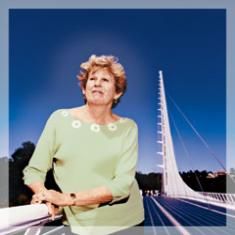I was taking a quick dip in the hot tub that evening, before going to teach a class at our community college. I was thinking about the music I’d play at church that Sunday and about how glad I was that my husband, Don, and I had moved to northern California. We were in the heart of wine country—an Eden-like land of gentle hills, lush valleys and gorgeous light.
Our first couple of months here we drove around finding spots where we could watch the light play across the landscape, soft shadows caressing the verdant hills. It was the kind of beauty—like all true beauty—that touched the soul. It was the beauty of God.
I glanced at my watch. Six o’clock!
I stood up, swung my leg over the side and felt around with my foot for the redwood bench that we used to climb in and out of the hot tub. My toes brushed wood and I stood.
Crack! The bench snapped beneath me. I was falling onto the patio. No time to catch myself. Out of nowhere, a line from Deuteronomy shot through my mind: “Underneath are the everlasting arms.” Well, I’ll need them, I thought. My head hit the cement, hard, and everything went black.
Then I was in an ambulance, drifting in and out of consciousness. Doctors at the hospital ran a CAT scan. Then a minister arrived. “God, please be with Trudie,” I heard him say grimly. I tried to pray with him but I couldn’t form the words.
I was feeling very, very sick—nausea worse than I ever thought nausea could be. I heard a doctor’s voice: “Possible skull fracture.” No, I thought. I can’t miss work tomorrow. Then I went out again.
Cranial X rays revealed no obvious serious damage. The surgeon wasn’t buying it. My symptoms were too severe. After further exploratory work he discovered what he’d suspected: an acute subdural hematoma. In other words, my brain was bleeding and I would die if it wasn’t stopped. The problem was, the doctor explained to Don, I didn’t face very good odds of surviving the surgery either.
But I did make it through the seven-hour surgical ordeal. Doctors wrapped my head in a huge bandage. They also told Don to expect that I’d have permanent, possibly debilitating brain damage. Of course, I didn’t hear any of this. Inside my turban of bandages in the ICU, I was far, far away. Wonderfully far away. White clouds scudded through a timeless sky. The pain, nausea—all of it was gone. I felt embraced by a warmth and love such as I’d never experienced in all my life. And the light! It was everywhere, shining on me and through me, pervading me with its illumination, as if every cell in my body was aglow. It was…life-giving.
The words of Scripture came back: “The eternal God is your refuge and underneath are the everlasting arms.” I was being held in God’s everlasting arms, bathed in his healing light. Was I alive? Dead?
A voice finally pulled me away. “It’s been a full week now,” someone said. “If she doesn’t come around soon, she may be in real trouble.”
My eyes snapped open. Where was I? Tubes and monitors were attached to me. I felt like I was half-machine. Two nurses stood at the foot of my bed. “A week?” I said, as if I’d been part of the conversation the whole time. “I’ve been lying here a whole week?” The nurses gaped at me as if I were Lazarus.
The next day I moved off the ICU to a regular ward. Soon I began physical therapy. Yet the physical world was so unreal! My arms, my legs, my hands, my feet—all seemed completely strange to me, like a device I had to master the controls of for the first time. Just getting a forkful of food to my mouth was a struggle. And why bother? I couldn’t taste anything anyway.
“The blow affected the part of your brain that controls taste and smell,” the doctor explained. “You may never get those senses back.”
I made remarkable progress, though. A few weeks later Don walked me gingerly out of the hospital and into our car. I was certainly still shaky but the doctors said that it was a miracle I was even going home.
“I can’t wait to see the house again,” I said. The sun shone through the redwoods flashing by outside. I thought of all the things I wanted to do: putter in the garden, sit out on the deck. “Maybe I can even play the piano a little,” I mused.
“Trudie,” Don said, obviously measuring his words, “try not to expect too much, especially at the beginning.”
Don was right. The simplest stuff—clearing the dishes, walking outside, even reading—made me exhausted and dizzy. I feared the discovery of further residual damage. I couldn’t perform tasks that just a month earlier I did without thinking. Now I had to think through everything. It was frustrating, exhausting, disheartening.
A day after coming home, I had an urge. I asked Don to take me for a ride through the countryside, like we’d taken so often back when we first arrived.
“Oh, remember that place?” I said as we approached a big visitor’s center with a particularly memorable view. “You can see for miles and miles from the top of it.”
“You think you’re up to those stairs?” Don asked me.
“I want to try,” I said.
I set off up that staircase like a mountain climber attacking Half Dome. I was practically crawling by the time I made it to the top. I looked out at the sun-dappled valley, the velveteen hills, and thought, Thank you, Lord. Thank you for the gift of my life. Thank you for the gift of the light.
I hadn’t dared to sit down at the piano since I’d come home. But one afternoon some friends came over and asked me to. Don pulled me up and led me to the piano.
I sat down at the bench and placed my hands on the keys. They just sat there. Move! I ordered them. No go. A spasm of despair went through me. Lord, am I ever going to get better? Is music gone too, like taste and smell? I closed my eyes, squeezed them tight. And all at once I was back in that timeless place where the light poured through me like sun through a window. I felt an overwhelming sensation of being comforted and cared for. I began to play. Haltingly, for sure, not with the confidence I once had. But I was playing! When I opened my eyes again, tears streamed down my face.
Back at church I felt comforted by all the kind words from my fellow parishioners who’d prayed for me while I was in the hospital. But, of course, other people played the songs on the organ now. Sometimes, beautiful as they were, it hurt a little to listen to them.
One Sunday, as the service was about to begin, the musical director stood up and said, “I would like to ask someone we all know to provide us with some musical accompaniment.”
The director’s eyes met mine. “Trudie, would you care to come up and play?”
I felt my face flush. Don took my hand. “Trudie,” he whispered into my ear, “you can do this.”
I made my way down the aisle toward the organ. I slid up onto the bench and stared down at the daunting double array of manuals, foot pedals and stops in front of me. Would my hands and feet obey me? Would the musical part of my brain respond? I raised my hands and thought back to the place I’d gone, and the radiant, healing light. A light that would be with me always. That was with me right at that moment. I felt it in my hands.
My fingers struck the keys. The walls shook as the church filled with the opening bars of “Come Let Us Worship.” It was a little hard seeing through the tears coursing down my cheeks. My hands and feet knew just where to go. By the time they came down on the final chord, the whole church was applauding.
In August 1986, almost four months after my accident, I met with my doctor for the results of my latest EEG. “Trudie,” he said, spreading the printout across his desk, “your EEG is normal. Completely normal. There’s only one thing to call this. A miracle.”
I never did try to explain to the doctors my experience of the light. This year marks the 20th anniversary of the fall that almost ended my life, and the beginning of a miraculous and mysterious healing journey that continues to this day.
There was indeed some lasting damage. I’ve never recovered my sense of smell and taste. Oh, but in the end, I was given so much more!





